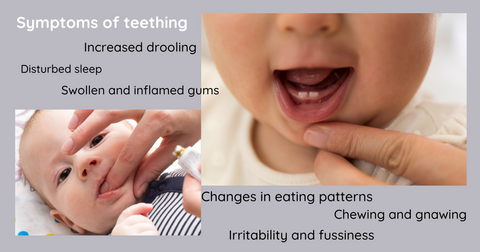Understanding Baby's Gums: A Guide to Teething
Introduction:
Teething is a significant developmental milestone in a baby's life, marking the eruption of their primary teeth through the gums. While it's an exciting time for parents to witness their baby's first teeth emerging, it can also be a challenging period for both the baby and caregivers due to discomfort and fussiness. In this blog post, we'll delve into the fascinating world of baby's gums during teething, exploring the process, signs of teething, and how to alleviate discomfort.

Understanding the Teething Process:
Teething typically begins around 6 months of age, although it can vary widely among individual babies. The process involves the gradual emergence of teeth through the gums, starting with the lower front teeth (lower central incisors) followed by the upper front teeth (upper central incisors). Over time, the rest of the baby's primary teeth will continue to erupt until around age 3.
During teething, the baby's gums undergo significant changes to accommodate the emerging teeth. The gums may appear swollen, red, and tender to the touch as the teeth push through the surface. This can cause discomfort and irritability in babies, leading to symptoms such as drooling, chewing on objects, and disrupted sleep patterns.
Signs of Teething:
Recognising the signs of teething can help parents provide timely support and comfort to their babies. Some common signs of teething include:
-
Increased drooling: Excessive drooling is a typical sign of teething as the baby's salivary glands become more active during this time.
-
Chewing and gnawing: Babies may instinctively chew on objects such as toys, fingers, or even furniture to alleviate gum discomfort.
-
Irritability and fussiness: Teething can cause discomfort and pain, leading to irritability and fussiness in babies.
-
Swollen or inflamed gums: The gums may appear red, swollen, and tender as the teeth begin to erupt.
-
Changes in eating and sleeping patterns: Some babies may experience changes in appetite and sleep patterns during teething due to discomfort and pain.
Alleviating Discomfort:
While teething is a natural process, there are several ways parents can help alleviate their baby's discomfort:
-
Provide teething toys: Teething toys offer babies a safe and soothing way to massage their gums and relieve discomfort. Look for toys made from soft, BPA-free materials that are specifically designed for teething babies.
-
Use chilled teething rings or washcloths: Cold can help numb sore gums and provide temporary relief from teething pain. Chill teething rings or damp washcloths in the refrigerator (not freezer) before giving them to your baby to chew on.
-
Gentle gum massage: Use a clean finger or a soft, damp cloth to gently massage your baby's gums. The pressure can help alleviate discomfort and soothe sore gums.
-
Over-the-counter pain relief: If your baby is particularly uncomfortable, you may consider using over-the-counter pain relief medications such as infant acetaminophen or ibuprofen. However, it's essential to consult with your GP before giving any medication to your baby.
-
Comfort and cuddles: Sometimes, all a teething baby needs is some extra love and comfort from their parents. Offer plenty of snuggles, cuddles, and soothing words to help reassure your baby during this challenging time.
Conclusion:
Teething is a natural process that all babies go through, but it can be a challenging time for both babies and parents. By understanding the teething process, recognising the signs of teething, and employing effective strategies to alleviate discomfort, parents can help their babies navigate this milestone with greater ease and comfort. Remember to be patient, provide plenty of love and support, and consult with your GP if you have any concerns about your baby's teething symptoms.


